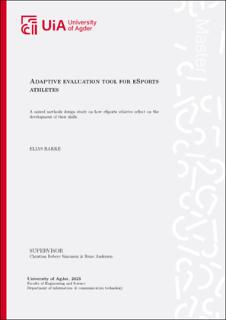| dc.description.abstract | ESports has evolved at an exponential rate over the past two decades, and is constantly growing. While a lot of research has been conducted on various aspects of the recent phenomenon, there is still a limited amount of information and no comprehensive framework on how eSports athletes should train. Thus, the purpose of this thesis has been to better understand how eSports athletes reflect on their skills, and how third-party software impacts eSports athletes in improving their skills.
The research questions involve how eSports athletes reflect on their skills, how third-party software make eSports athletes better, and to what extent a third-party software impact eSports athletes improvement. Therefore, the theoretical background was comprised of games, skills, and motivation. The theoretical background includes digital games, eSports, eSports skills, and motivational theories such as Two-factor theory, Self-determination theory, and Extrinsic- and Intrinsic motivation. I have used a hermeneutical approach with a mixed methods design comprised of semi-structured interviews and a questionnaire. First, a total of eight semi-structured interviews were conducted, followed up by a questionnaire developed to generalize and reinforce the qualitative data.
The findings from the research show both paradigms and differences in how eSports athletes reflect based on various factors. The eSports athletes reflect differently based on which game genre they play in, and what skill level they are playing on. Although there are paradigms present that slightly moves in favor of certain groups based on their skill level and game genre, there are still variation in how each individual think within the same groups. Moreover, in terms of third-party software, indicators show that FPS-players are more inclined to utilize a third-party software that are made for improving mechanical skills, while MOBAplayers are more inclined to utilize third-party software that are made for data tracking, statistics, and data analysis.
Keywords: eSports, third-party software, skills, motivation | |
